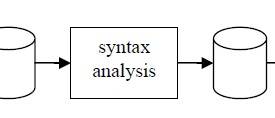About
A token that has a name is called an identifier.
Example:
- function
- …
Articles Related
Example:
Consider the following programming expression:
sum = 3 + 2;
Tokenized in the following table:
| Token | |
|---|---|
| Lexeme | Lexeme type |
| sum | Identifier |
| = | Assignment operator |
| 3 | Integer literal |
| + | Addition operator |
| 2 | Integer literal |
| ; | End of statement |
